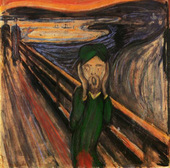|
there's actually a wild amount of online theories about Punic etymologies for a lot of European place names, it's almost funny, but also a lot of it probably isn't very legitimate
|
|
|
|
|

|
| # ? May 24, 2024 23:14 |
|
I like to imagine historians in the future of the LP timeline being pissed at the Carthaginians for razing Rome and making the study of Latin a nightmare, in the same way studying Carthaginian language in the OTL is an uphill battle because Rome destroyed so many sources.
|
|
|
|
hashashash posted:there's actually a wild amount of online theories about Punic etymologies for a lot of European place names, it's almost funny, but also a lot of it probably isn't very legitimate Well in this timeline they're all legitimate!!
|
|
|
|
Island in Punic is Iw (Iy in Hebrew), which sounds similar to Eire.
|
|
|
|
So many basic things we don't know about an advanced, powerful, Mediterranean-spanning civilization. It's wild how thoroughly the Romans hosed them up.
|
|
|
|
hashashash posted:also in general, if anyone has any decent ideas for Punic or Hebrew-based names for places, then let me know! Names for the places we have colonies -- Ireland, Britain, Gaul, Scandinavia etc. -- are probably all that's 100% necessary Lilybaya in London: I like the notion of Punic "Pretan" meaning Tin for the sake of this narrative. One of the big Tin-areas of the ancient world was the Devon area of modern Cornwall, or Dumnonia as it was known then. This is also the power which in the game managed to put most of the British Isles under its domain. If nothing else having the Carthaginian colony be referencing the "Tinland" makes at least a bit of sense from a Punic merchant perspective. How this would look in Punic I do not know... Qart-Pretan, City of Tin? If they manage to take it all I like the notion of "Pretannia", the Tin Lands, or "Brythonia" if it manages to stay in Dumnonian/Brythonic hands. Other alternatives are "Land of the Hills" due to the British landscape or "Land of the Painted People" due to the supposed prevalence of body-paint in Insular Celtic cultures of the times. Another alternative is "The White Land" referencing the Cliffs of Dover, which is in fact a fringe theory for the origin of the name Albion. Qart Hadahst in Brittany: Brittany too was a source of ancient tin, so many of the above notions for "Tinland" - Qart-Pretan - can be used equally well here as above. The ancient name Armorica is not only used already by the local Gaullic power but translates into "Land by the Sea", which while true can be used for most of Carthage. The native tribes in the area were the Venetii - "The Friendly Folk" - and the Osismii - "The Ultimate/Outmost/Remote Folk" - which I guess could work in a Qart-Venet / Qart-Ushmy sort of way? Tabarkon in the Baltic Sea: Any reference to North could work really. Otherwise referencing the Gutes of Gotland or the almost fortified geology of Bornholm (something like The Cliff Islands) would be good alternatives.
|
|
|
|
For Armarea in Sri Lanka, maybe a reference to the land bridge connecting northern Sri Lanka to Tamil Nadu, which of course wouldn't be named Adam's Bridge, or either the Tamils or Sinhalese. The Tamils were notorious for their trade connections, though, so I feel like they would leave a stronger impression on the Carthaginians. Maybe something like Qart Tamiliya or Eresh Tamiliya?
|
|
|
|
^^^ those are some excellent suggestions, I reckon we'll go with Makrum or Makrum-sal (dervied from rocky isle) for the Baltic Punics, and I like Qart Tamiliya for the Indian Punics As for the british Punics, Qart Pretan (or just Pretan/Pretannia) works well -- Dumnonia prospers in between games, so I'll have them reform to Brythonia for the start of CK3
|
|
|
|
Eleven Eleven posted:Island in Punic is Iw (Iy in Hebrew), which sounds similar to Eire. apparently theres also evidence for Ireland being a source of copper, so something like 'Eriju' -- which means isle of copper -- is quite similar to Eire and still works quite well
|
|
|
|
|
hashashash posted:^^^ those are some excellent suggestions, I reckon we'll go with Makrum or Makrum-sal (dervied from rocky isle) for the Baltic Punics, and I like Qart Tamiliya for the Indian Punics Excellent so we get still get Britain and it has no English or Scots!
|
|
|
|
though obviously that goes out the window if the Slavs knock them out
|
|
|
|
|
hashashash posted:sweet, well your vote came up in the rolls so I guess we'll be getting medieval Galatia I speak pretty decent Hebrew, I can pitch in. Hell, if anyone wants to suggest names in English, I can translate them (e.g., New City -> Qart-Hadasht). Otherwise I'll can look some things up on my own.
|
|
|
|
Luhood posted:the Devon area of modern Cornwall What the gently caress, does the Tamar mean nothing to you?
|
|
|
Viola the Mad posted:I speak pretty decent Hebrew, I can pitch in. Hell, if anyone wants to suggest names in English, I can translate them (e.g., New City -> Qart-Hadasht). Otherwise I'll can look some things up on my own. sweet! I did some translations for these, but I'm pretty sure they're off so whatever you can offer would be great -- - "city on the Bridge" - "city in the North" - "city of stone" - "island-city" - "tin-land" / "tin-country" - "copper-land" - "land/country by the sea" - "black country" - "final city"
|
|
|
|
|
I'm very excited to see how the early medieval thunderdome works out.
|
|
|
|
sebzilla posted:What the gently caress, does the Tamar mean nothing to you? It actually doesn't, I am a bit of an uncultured swine like that
|
|
|
|
hashashash posted:sweet! I did some translations for these, but I'm pretty sure they're off so whatever you can offer would be great -- Feel free to replace 'Eir' with 'Qart' as you feel" - "city on the Bridge" Eir Al-Gesher or maybe just Eir Gesher - "city in the North" Tzfuna (oo type U) sounds cool to me and it also means obscured or hidden for extra cool points - "city of stone" Eir Even (eh type Es) - "island-city" Lev Ha'ee "Heart(center) of the island" - "tin-land" / "tin-country" Eretz Badil - "copper-land" Nekhosh'etit is a diminutive I just made for copper, so "copperite"? - "land/country by the sea" Yamit is an actual modern place name, lets ignore the politics though because it's a lovely name https://en.wikipedia.org/wiki/Yamit - "black country" Eretz Sh'chor (ch like haram) - "final city" Qart Soufit/ Qart Ha'Soufit E: Tangentially related: tin is one of the metals significant enough to be have purifying instructions when the Israelites "avenge themselves" on the Midianites, "Only the gold, silver, bronze, iron, tin, and lead -everything that can withstand the fire— must be put through the fire, and it will be clean. " -Numbers 31:22-23 By popular demand fucked around with this message at 14:58 on Jan 29, 2023 |
|
|
|
^^ that's some excellent stuff, thanks!
|
|
|
|
|
No problem, I encourage any lurking Hebrew speakers and scholars to give their opinions on my suggestions too.
|
|
|
|
By popular demand posted:Feel free to replace 'Eir' with 'Qart' as you feel" Beat me to the punch! I'd transliterate עִיר as Ir (pronounced like "ear"), but this feels like splitting hairs--we can derive the Punic word from Qart-Hadasht, "New City." Hadasht is a pretty clear cognate for "chadash," the Hebrew word for new, which leaves Qart as "city." Related to that, it seems that Punic grammar uses the noun-adjective order, like all the other Semitic languages. Also, Qart haSofit sounds fantastic. On a completely different topic, an absolutely mad idea struck me as I was going to bed last night--use English for Roman names. Hear me out! A bunch of Romance language speakers invaded a land of of Germanic language speakers and then culturally melded with their subjects. Of course their languages would fuse into a new bastard language. And that actually happened in the OTL--it's called the Norman Conquest. Hell, by the time CK3 starts, this new Latin-Germanic mish-mash would have been evolving for almost as long as modern English. So why not use our Latin-Germanic mish-mash for this culture? Obviously you can have fun with it--maybe "thing" still means "assembly," for example--but using English as a base could make things easier.
|
|
|
|
I am 900% sure there's conlangs out there already that do that to German.
|
|
|
|
By popular demand posted:- "tin-land" / "tin-country" But where's Kavodel?
|
|
|
Viola the Mad posted:Beat me to the punch! I'd transliterate עִיר as Ir (pronounced like "ear"), but this feels like splitting hairs--we can derive the Punic word from Qart-Hadasht, "New City." Hadasht is a pretty clear cognate for "chadash," the Hebrew word for new, which leaves Qart as "city." Related to that, it seems that Punic grammar uses the noun-adjective order, like all the other Semitic languages. Also, Qart haSofit sounds fantastic. the english are inevitable  but yeah that absolutely makes sense, especially since there'll be the Danish/viking influence as well (as per the vote)
|
|
|
|
|
We may have created the English accidentally but atleast we didn't kill the Romans only to become the Romans.
|
|
|
|
See, this is why I voted for Masva to stick around: to be a counterbalance to the English.
|
|
|
|
if anyone's decent at Latin or Romance stuff --- a decent name for a Romano-Norse religion and culture would be useful hashashash fucked around with this message at 23:10 on Feb 5, 2023 |
|
|
|
|
Whatever it's named, it should have a Romagnarok
|
|
|
|
A Ragnarome, surely.
|
|
|
|
hashashash posted:if anyone's decent at Latin or Romance stuff --- a decent name for a Romano-Norse religion and culture would be useful I mean, the OTL Byzantine Greeks called themselves "Romans" until well after the Ottoman conquests...
|
|
|
|
Well yeah but they were Romans for like a milennia at that point, whereas these guys lost Rome in like.... 300 years or something?
|
|
|
|
Well a portmanteau of Northmen and Romans is Normans…
|
|
|
Technowolf posted:I mean, the OTL Byzantine Greeks called themselves "Romans" until well after the Ottoman conquests... yea I flip-flopped a bit between calling them Romans or having something new to represent their hybridisation with the Norse, still not set on which one though also I do still need a name for their religion, Helleno-Norse sounds a bit grim. might just go with Neo Norse or something
|
|
|
|
|
Plenty of neat crossover among the major figures in both pantheons anyway, apart from Jupiter being sort of an Odin/Thor amalgam.
|
|
|
|
hashashash posted:yea I flip-flopped a bit between calling them Romans or having something new to represent their hybridisation with the Norse, still not set on which one though I'd imagine there would be a lot of syncretism between their old gods and the new northern ones, with the Romans still thinking of their religious practices as a continuation of their old ones. We're a little hampered because the Romans didn't really treat their religion as a single codified thing and neither did the Norse. The closest thing for the Romans might have been "cultus deorum," the proper treatment or cultivation of the gods, and for the Norse it's "forn sið" or old custom (the definition in opposition to heiðinn sið, Christianity, indicating that the arrival of new religions leads to an understanding of the "old ways" as a distinct set of things rather than just part of life). That being the case, I'd argue that the Roman terms might have more sway in the syncretism, which might give us something calling itself "the Cult" of some kind. Or if the Norse influence is a bit stronger, maybe we get "Kjarr sið."
|
|
|
|
There's likely some level of syncreticism, but also potentially, if the Norse at the leading culture, an addition to the groups of gods such that in addition to the Aesir and Vanir, there's a third group called the Rumir or something. Whereas if the Romans were more culturally dominant, elements maybe wholesale subsumed just as when the mythos of the Greeks were merged with the Roman myths
|
|
|
|
Xelkelvos posted:There's likely some level of syncreticism, but also potentially, if the Norse at the leading culture, an addition to the groups of gods such that in addition to the Aesir and Vanir, there's a third group called the Rumir or something. Whereas if the Romans were more culturally dominant, elements maybe wholesale subsumed just as when the mythos of the Greeks were merged with the Roman myths That's a good point. If the Norse have the cultural upper hand I'd absolutely expect to see some Rumir, particularly if we're willing to roll with the theory that the Aesir/Vanir split is a remnant of even older invasion syncretism. The Romans would be way more willing to sit down and draw up Pokemon type charts trying to figure out how to map the Norse deities onto their own.
|
|
|
Quorum posted:I'd imagine there would be a lot of syncretism between their old gods and the new northern ones, with the Romans still thinking of their religious practices as a continuation of their old ones. We're a little hampered because the Romans didn't really treat their religion as a single codified thing and neither did the Norse. The closest thing for the Romans might have been "cultus deorum," the proper treatment or cultivation of the gods, and for the Norse it's "forn sið" or old custom (the definition in opposition to heiðinn sið, Christianity, indicating that the arrival of new religions leads to an understanding of the "old ways" as a distinct set of things rather than just part of life). That being the case, I'd argue that the Roman terms might have more sway in the syncretism, which might give us something calling itself "the Cult" of some kind. Or if the Norse influence is a bit stronger, maybe we get "Kjarr sið." This makes a ton of sense, I think going for something like 'Imperial Cult' or even just 'Cultus Deorum' would be good, especially since we could just go with the position of Emperor and Pontifex Maximus combining into a single office during the Roman exile I also like giving the Norse some weight in the syncretism, so Ima go with 'Rumir' as well Also a bit of reading tells me that there was some interpretatio romana going on with the Germanics as well, with the Romans apparently associating Odin with Mercury?
|
|
|
|
|
Xelkelvos posted:There's likely some level of syncreticism, but also potentially, if the Norse at the leading culture, an addition to the groups of gods such that in addition to the Aesir and Vanir, there's a third group called the Rumir or something. The Romans didn't really appear to give that much of a poo poo about their own customary religion over the long run, so it's also possible they just adopted the gods of the Norse wholesale through syncretic identification. So I like this idea.
|
|
|
|
Weavered posted:Well a portmanteau of Northmen and Romans is Normans… Also this!
|
|
|
|

|
| # ? May 24, 2024 23:14 |
|
GunnerJ posted:The Romans didn't really appear to give that much of a poo poo about their own customary religion over the long run, so it's also possible they just adopted the gods of the Norse wholesale through syncretic identification. So I like this idea. Honestly, I don't really think this checks out? Non-codified religions are a complicated beast for us to understand when we're not used to that, but there's plenty of evidence that the romans who followed Hellenic religion were pretty drat serious about it. Many Christian traditions practiced to this day were adaptations of earlier Roman ones to make the jump easier for the Hellenic faithful - for example, archaeologists estimate Jesus was born around August, but we celebrate Christmas near the Winter Solstice because that's when an earlier, pagan Roman festival happened, and the traditions of gift-giving and tree-decorating come from there as well. Also, even after Christianity became the Empire's official religion, there is plenty of evidence of local elites maintaining pagan customs for a while. This blog post by a professional ancient historian goes into depth about how the religious transition happened. I think it would be interesting to have some sort of division in the Norse-Roman religion, in which the official doctrine observed by the elites of Roman descent has more Hellenic elements than the folk religion practiced by the people. That's what happened IRL as Christianity expanded in Europe; before the first Inquisition in the 12th century, the Catholic Church was a lot more heterogeneous in its practices because the local, pagan customs of each locale mixed with Christian teachings, which led to a mish-mash of local regional variants of Catholicism, even though the theology being taught to the priests was theoretically the same. If you meant the Romans adopting Hellenic gods in the first place, though, they probably did that because of the Etruscans, who contributed to many institutions and traditions of the late Roman Kingdom and early Republic. It's unlikely the Norse would get the same treatment, as the Romans probably see them as lowly barbarians, rather than a beacon of civilization to emulate as they did Etruria and Greece. Luca_024 fucked around with this message at 15:26 on Feb 6, 2023 |
|
|





























